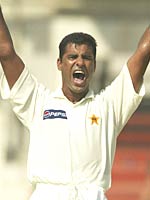A Test in name only
Daniel Laidlaw
Test cricket earns its name, presumably, because it is the ultimate test of
skill, temperament, character and spirit. The demands made upon the
protagonists are like none other in a battle of wills that can stretch
across five gruelling days. In many ways, at least to the converted, it is
the ultimate sporting contest.
By that criteria, the Australia v Pakistan first-class match that started
last Friday and finished 147 overs later on Saturday was a Test in name
only. Of skill, it was exhibited only by one side. Of temperament, by just
one batsman. Of character and spirit, there was none to be found by one
batting line-up. Thus occurred just the second two-day Test since 1946, the
two lowest-ever scores in Pakistan's 287-Test history, and cumulatively the
fourth lowest total in Test history.
Australia's first Test demolition of South Africa in February, one-sided
thrashing that it was, was still a perfectly played match by one side
against strong (although they did not show it) opposition.
Australia-Pakistan in the second Test was just uncompetitive; a fairly
joyless, incredible walkover. Tellingly, even remorseless competitor Steve
Waugh, one of the last people likely to show sympathy for a wounded foe,
admitted the result "feels a bit hollow". The Australians love a good fight,
and while they can rightly take pride in their execution, it's not much fun
when the opposition doesn't punch back.
 Weakened side that they presently are, Pakistan should not be that bad.
Waqar Younis, Shoaib Akhtar and Saqlain Mushtaq certainly represent a highly
respectable bowling attack, and no blame is to be apportioned there. It was
Pakistan's young batsmen who were exposed, the absence through injury of
Inzamam-ul-Haq and Yousuf Youhana leaving them vulnerable to the
inconsistency of inexperience. Imran Nazir, Taufeeq Umar, Misbah-ul-Haq and
Faisal Iqbal showed in the first Test that they have the confidence and
ability to make Australia work to beat them. But Test cricket is about more
than that, and it must be disturbing that none showed the necessary
application on a slow pitch that required graft.
Weakened side that they presently are, Pakistan should not be that bad.
Waqar Younis, Shoaib Akhtar and Saqlain Mushtaq certainly represent a highly
respectable bowling attack, and no blame is to be apportioned there. It was
Pakistan's young batsmen who were exposed, the absence through injury of
Inzamam-ul-Haq and Yousuf Youhana leaving them vulnerable to the
inconsistency of inexperience. Imran Nazir, Taufeeq Umar, Misbah-ul-Haq and
Faisal Iqbal showed in the first Test that they have the confidence and
ability to make Australia work to beat them. But Test cricket is about more
than that, and it must be disturbing that none showed the necessary
application on a slow pitch that required graft.
The genesis of the debacle that was the second Test had to be found in the
first. In confounding expectations of a one-sided contest and running
Australia close, Pakistan must have surprised themselves. If anything, the
dismal showing in the second Test was a result of complacency, not lack of
ability. Former Pakistan great Hanif Mohammad told Dawn : "(The) youngsters
were overconfident after their good showing in the first Test." Why that
should have been so is difficult to fathom, but complacency does indeed
appear to have been a factor.
In searing heat, application was the need of the day. Matthew Hayden grafted
his way to 119 -- seven more than Pakistan's two innings combined -- and was
the only batsman to pass 44. Patience and endurance were the primary
requirements, but Pakistan's batsmen, in between a fairly gallant bowling
effort, lacked the dedication for a fight.
Pakistan nevertheless remain a tough team, and it is worth recalling that
after Australia bowled West Indies out for 51 in 1999 they proceeded to lose
the next two Tests. Apart from a certain Brian Lara, one difference now is
that Shane Warne is fit and bowling with confidence and craft, against his
favourite opponents.
 When we think of Warne's bunnies, South Africans and Englishmen come to
mind, but it's not as well acknowledged how poorly Pakistan have fared
against him. Pakistan actually has the worst record against Warne, with the
leg-spinner now having taken 68 wickets in 11 Tests against Pakistan at
18.88 compared to 118 in 23 against England at 22.82, suggesting it is a
fallacy to list Pakistan alongside Indian and Sri Lanka as the foremost
players of slow bowling simply because they are a sub-continent team. In
reality, the only real difference between Pakistan and England vs Warne has
been confidence. Whereas England have typically sought to play him
defensively, Pakistan rookie Faisal Iqbal had the inherent confidence to
combat him aggressively, which is naturally more effective against a bowler
used to dominating.
When we think of Warne's bunnies, South Africans and Englishmen come to
mind, but it's not as well acknowledged how poorly Pakistan have fared
against him. Pakistan actually has the worst record against Warne, with the
leg-spinner now having taken 68 wickets in 11 Tests against Pakistan at
18.88 compared to 118 in 23 against England at 22.82, suggesting it is a
fallacy to list Pakistan alongside Indian and Sri Lanka as the foremost
players of slow bowling simply because they are a sub-continent team. In
reality, the only real difference between Pakistan and England vs Warne has
been confidence. Whereas England have typically sought to play him
defensively, Pakistan rookie Faisal Iqbal had the inherent confidence to
combat him aggressively, which is naturally more effective against a bowler
used to dominating.
In addition to the injured Inzamam and Youhana, Pakistan would have been
aided by the presence of Saeed Anwar and Wasim Akram, for whose absences
there are conflicting explanations. Some reports claim they asked to be
rested, others say they were ousted. Considering they both played in the
commercial off-season event in England, one has to assume the latter is
true, and that the PCB disguised their omission by claiming they had asked
to be rested. The loss of at least one experienced batsman, then, is
self-inflicted.
Prevented from self-inflicted departures in the wake of the defeat were PCB
chairman Tauqir Zia and director Chishty Mujahid. The temporary resignations
appear to have been a charade, designed to give the officials a noble
appearance of accountability and self-sacrifice. Why they should have
considered themselves directly responsible for what occurred on the field in
the first place, to the degree that their jobs hinged upon it, is not clear.
Players aren't held accountable for what happens at Board level -- or at
least, they shouldn't be -- so why should Board members feel directly
responsible for what transpires on the field? In the bigger picture, of
course, they are, but not on a match-by-match basis.
If PCB officials were considered to have selected the wrong team, or failed
to implement the necessary structure and environment conducive to the
success of the side, then genuine resignations would be justified. However,
once a team is selected and the processes are deemed to be correct, what
occurs on the field, positive or otherwise, should not affect Board
positions. If Zia and Mujahid are unfit for the job, then they should not be
there in the first place, irrespective of what happens against Australia.
The resignations now seem to have been nothing more than face-saving
gamesmanship, just another minor incident in the long history of convoluted
cricket politics.
Waqar Younis, of course, would have seen it all before, and his young
charges are now receiving an initiation in the consequences of losing badly.
If they are not scarred by the experienced then, paradoxically, they may
eventually be better for it. That is, if they are not the next target of
Board shenanigans.
More Columns
Mail Daniel Laidlaw